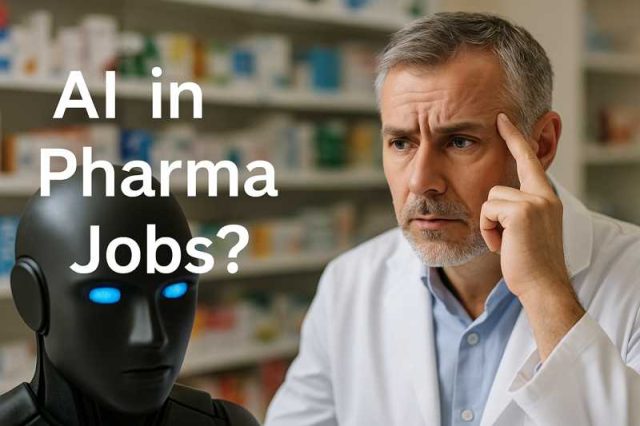Artificial intelligence is no longer a futuristic concept—it’s here and evolving fast. From automating clinical trials to generating marketing insights, AI in pharma jobs is transforming the healthcare industry. But with automation accelerating, a pressing question emerges: will AI replace pharma jobs or enhance them?
Table of Contents
- The Rise of AI in Pharma
- Roles Most at Risk (and Why)
- Emerging Opportunities Through AI
- Strategic Adaptation for the Pharma Workforce
- Conclusion
- FAQs
The Rise of AI in Pharma
Artificial intelligence is reshaping how pharmaceutical companies operate. AI in pharma jobs has grown from niche applications to enterprise-wide integration. Machine learning tools are now used in drug discovery, predicting patient adherence, optimizing digital advertising, and even tailoring outreach to healthcare professionals.
According to a report by McKinsey, AI-enabled drug discovery has the potential to reduce development timelines by up to 30%. This technology is also streamlining regulatory compliance and enhancing data analysis from real-world evidence. Platforms such as ChatGPT, IBM Watson, and DeepMind are being adapted for pharmacovigilance, scientific research, and patient engagement.
Despite the clear advantages, AI adoption is creating unease. Many pharma employees question whether their roles will become obsolete. However, experts emphasize that while some routine tasks may disappear, the core of pharma—research, empathy, and strategy—still requires human input. Automation may redefine jobs, but it won’t eliminate the need for skilled professionals.
Roles Most at Risk (and Why)
Not all pharma jobs face equal threat from automation. Tasks that are repetitive, data-heavy, or rules-based are most vulnerable. For example, medical data entry, pharmacovigilance documentation, and basic regulatory filing are increasingly handled by intelligent systems.
Similarly, AI-powered chatbots are handling basic medical inquiries, cutting down the need for junior-level medical information officers. In the marketing realm, programmatic advertising tools and natural language generators are creating content and targeting strategies with minimal human oversight.
However, this does not spell extinction for pharma marketers, researchers, or MSLs (Medical Science Liaisons). Instead, it pushes these roles to evolve. While AI can write copy or sort data, it cannot strategize, empathize, or innovate like a skilled professional. Understanding therapeutic nuances or interpreting brand sentiment across multiple channels still requires human judgment.
For deeper insights into trends affecting pharma professionals, explore Pharma Marketing Network’s featured articles.
Emerging Opportunities Through AI
As some jobs transform, others are born. The rise of AI in pharma jobs is opening new career paths and skill demands. Positions such as AI trainers, data science liaisons, algorithm auditors, and digital transformation leads are growing rapidly.
Moreover, brand teams are now seeking talent that can integrate AI tools into campaign planning. Pharma marketers with experience in machine learning-based segmentation, real-time analytics, or automated content testing are in high demand. Those who understand both medicine and machine learning are uniquely positioned to thrive.
In clinical settings, AI allows physicians and researchers to focus more on patient-facing and high-cognition tasks. For instance, algorithms now process large imaging datasets, freeing radiologists to engage in consultative diagnosis. Likewise, real-time analytics from wearable data provide new inputs for endocrinologists, cardiologists, and behavioral scientists.
To understand how AI complements advertising strategy in pharma, visit eHealthcare Solutions.
Strategic Adaptation for the Pharma Workforce
The pharmaceutical industry must proactively prepare its workforce. Upskilling is not optional—it’s essential. Organizations should invest in AI literacy programs, cross-functional training, and collaboration between traditional and digital teams.
AI in pharma jobs isn’t a threat when approached with a growth mindset. Employees who embrace data fluency, adaptability, and tech-enabled problem solving will remain valuable assets. Rather than fearing job loss, professionals should explore how AI can offload routine work and enable greater creativity and insight.
Pharma companies are also beginning to form ethics boards to oversee AI implementation, ensuring transparency and fairness. These developments create opportunities for roles that didn’t exist five years ago—such as AI ethicists and digital compliance officers.
Additionally, agency partners and internal teams should align on how AI can be used responsibly for patient engagement, promotional content, and decision support. By doing so, pharma brands not only future-proof their workforce but also reinforce credibility in an increasingly digital world.
A well-structured change management plan, informed by cross-departmental feedback, will help ensure smooth integration. This includes recognizing internal talent, offering reskilling grants, and re-evaluating job descriptions as needed.
Conclusion
AI is revolutionizing pharma, but it doesn’t have to come at the cost of human jobs. Instead, it provides an opportunity to redefine roles, unlock efficiencies, and spark innovation. As long as pharma professionals remain agile and organizations foster ongoing learning, the industry can balance automation with human expertise.
Ultimately, AI in pharma jobs isn’t about replacement—it’s about redefinition. The winners will be those who adapt, learn, and lead the integration of technology with purpose.
FAQs
Will AI eliminate all pharma jobs?
No. AI may automate certain tasks, but it is expected to complement rather than fully replace human roles, especially those involving strategy, empathy, and complex decision-making.
Which pharma roles are most affected by AI?
Roles involving repetitive data entry, compliance monitoring, and standardized reporting are most likely to be impacted. Strategic, creative, and patient-facing roles remain essential.
Can pharma marketers benefit from AI?
Absolutely. AI can enhance targeting, optimize campaign performance, and automate content generation—freeing marketers to focus on innovation and brand building.
What new career paths is AI creating in pharma?
Roles such as data translators, AI strategists, digital transformation managers, and algorithm auditors are emerging as AI becomes integral to pharma operations.
How should pharma professionals prepare for AI adoption?
Upskilling in data analytics, machine learning basics, and cross-functional collaboration is key. Embracing change with a growth mindset will ensure long-term relevance.
Disclaimer
“This content is not medical advice. For any health issues, always consult a healthcare professional. In an emergency, call 911 or your local emergency services.”
